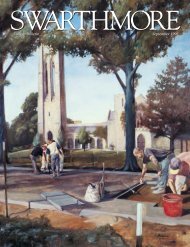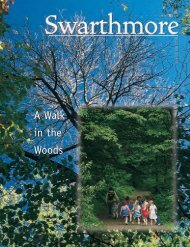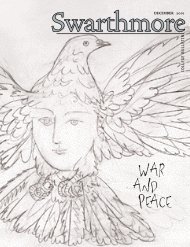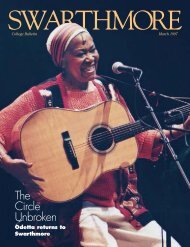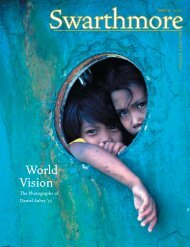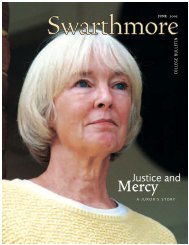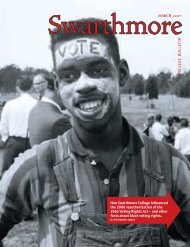profileSuds and ScienceBIOLOGIST GRETCHEN MARGARET MELLER ’90 HELPS TO CREATE AN INFORMAL OPPORTUNITY TO SHARE SCIENCE.Minas Tanielian of Boeing Phantom Works at a Science on Tapmeeting co-organized by Terri Gilbert (center), GretchenMargaret Meller (right), and (not shown) Anne Kao, JenniferWroblowski, and Rob Carlson. Volunteers interested in startingup events in other districts of Seattle should write to info@scienceontap.org.MAX DELAUBENFELSSeattle residents who were thirsty for a beer and a dose of intellectualstimulation headed for the Ravenna Third Bookstorepub on July 24. There, they were able to enjoy a drink and listen toMinas Tanielian of Boeing Phantom Works bring Star Trek technologyto life as he described the rapid advance in research on newtypes of materials—“metamaterials,” that render objects invisible toradar. During a short break following Tanielian’s presentation, audiencemembers discussed the topic among themselves and then hadthe opportunity to ask him questions.Tanielian was one of the speakers who appear monthly at thepub in a series called Science on Tap, co-founded by molecular biologistGretchen Margaret Meller ’90. The program provides a localforum for scientists to debate scientific and technological issueswith the public. The pub is open to audience members of all ages.Science on Tap is based on Café Scientifique, which began in1998 in the United Kingdom to promote public engagement withscience. It currently has more than 50 venues located on fivecontinents.Meller, a researcher in the Center for Perinatal Studies at Seattle’sSwedish Medical Center, says she was motivated to start Scienceon Tap by conversations with friends, who, knowing she is abiologist, would question her about science articles they had read inmagazines and newspapers.“I realized the problem with writing about science,” Meller says,“is that the reader doesn’t get to ask questions—and we all havequestions. When you go into the community and give the public achance to learn about science and ask questions in a safe, informalsetting, then they have a better opportunity to really understand thetopic. The informality of the space is critical to promoting discussion.”Along with other scientists and science writers, Meller lined upsome speakers and opened Science on Tap in the cozy bookstorepub in September 2004. So far, they have not missed a singlemonth, except for December, when they break for the holidays.Topics have included dark matter and dark energy, stem cells,childhood obesity, space elevators, electric airplanes, evolution andintelligent design, the science of brewing beer, and understandinghealth reports in the media. Typically, a speaker talks for about 20minutes, followed by a short break; they conclude with a discussionof up to an hour. Meetings usually attract from 30 to 50 participants.“For Evolution and Intelligent Design, we had 70 people,”Meller says, “but, thankfully, that’s unusual because the space ispretty small.”Meller has never presented at Science on Tap herself. “We’venever been that hard up for a speaker,” she jokes. She has, however,talked to community groups about basic concepts of molecular biology,genetics, and gene therapy. “I really enjoy giving those types oftalks because it forces me to let go of the details, which is hard for ascientist to do,” she says. “Scientists are known for their jargon. Butthe simplest talks are often the most compelling.”Science on Tap, Meller stresses, benefits both audience andspeakers. “These sessions are very interactive,” she says. “The speakersreally get a chance to discuss their work and learn about the concernsof people.”She hopes that the interactive nature of Science on Tap is onlythe beginning of a trend toward outreach by the scientific communityand, in turn, interest from the community in science.“There is so much that scientists can learn from an audience—and this audience represents the people who will be voting on issuesthat affect science,” Meller says. “I believe that this interactionbetween science and the public is long overdue. The pedestals onwhich scientists have put themselves—or on which others have putthem—need to be knocked away. Scientists should be able to talkabout their research with anyone who is interested, at any age,so that the sparks of scientific curiosity can blaze into meaningfuldiscussion.”—Carol Brévart-DemmUpcoming talks are listed at http://www.scienceontap.org.september 2006: 69
in my lifeBack to My NatureLESSONS FROM FRUIT AND VEGETABLESBy Elisabeth Commanday Swim ’99“Are you wearing a belt?” my stepbrotherEric asked as he walked me to thebeds of Sun Gold cherry tomatoes behindthe packing shed. I had left my double life asoffice worker and classical singer in NewYork City to harvest vegetables and learnabout Christine and Eric Taylor’s sustainablefarming practices. This was the firsttime that I had spent more than a day withmy extended family at Table Mountain Gardenin Murphys, Calif. Before this, the closestI had ever come to growing my own foodwas sprouting sunflower seeds on my Bronxliving-room windowsill.“No, but my pants have a drawstring,” Ianswered. Eric smiled and told me to tie mybucket to the waist of my pants. “That way,you’ll have both hands free for picking!”He was still beaming with pride after harvestingthe year’s first Brandywine tomatoes.One full tray of thin-skinned, bulgingbeauties would be enough to send thenext day’s market customers into a buzz ofthe vine diagonally. Most of them came offwhole, their little green top-stems stillintact.Self-doubt began to drip away like thesweat from my brow as I discovered a part ofmyself that had been hidden for years in thechaos of my urban life. The work became ameditation, the tomatoes my teachers. Ibegan to watch my thoughts come and go asI continued my singular task of usheringripe fruit into my bucket. From time to time,I let myself drift away on the currents of mymind, but, then, a carelessly picked greentomato would remind me gently to comeback to task.The next 2 weeks would be a course inwhat Buddhist teacher Thich Nhat Hanhcalls “the miracle of mindfulness.” Whetherpicking green and yellow squash from undertheir broad leafy canopies in the purple lightof dawn, digging in spiny cucumber bramblesfor white fruits with just the slightesttint of yellow, or grooming patches of babySelf-doubt began to drip away like the sweat from my brow.The work became a meditation, the tomatoes my teachers.anticipation of the bounty to come.The mid-afternoon sun beat down on usas Eric showed me how to pull the round,orange jewels off their vines. “You want topick them sideways,” he said, “that way, theywon’t break. If you’re good, you should beable to fill a bucket in about half an hour.”He grinned and started off toward the otherside of the garden. I looked down at mysmall hands, still pale from city office work,and at the large bucket hanging from mywaistband.Left alone with the orange fruit, I soondiscovered that my little hands were idealfor picking clusters of tomatoes that hungin the inner shade of the vines. I began tosearch for the ripe fruit using the sensorynerves in my skin. I would delve into thecenter of each patch feeling for warm,smooth bunches of fruit and ease them offlettuce to keep the weeds from making itinto the harvest, I began to relax into thework and to surrender my mind to thevegetables.I was amazed as I watched my sister-inlaw,Christine, work twice as fast as I felt Icould. She must have some sort of deepbond with the vegetables that guides her tothe ones that have reached their peak. Ormaybe she has just become so familiar withher patches of green that she has detailedmaps of the plant beds painted onto hersubconscious.Even following Christine around the garden,working under deadline to pick for themarket, became an exercise in mindfulness.I tried to keep my mind calm and openwhile working as quickly as possible. This, itseemed to me, was the essence of rightwork—full presence of mind in even themost difficult or repetitive physical tasks.After 10 days, my body had adjusted tothe odd schedule that had me up beforedawn, unconscious in the afternoon, andpicking or partying until sundown. Itseemed like no time had passed when mymother and stepfather arrived to help withthe harvest before driving me back to theirhome in Walnut Creek, Calif.On my last morning as a farmer, Christinegave my mother and me an unexpectedtreat. After we emptied our wheelbarrows ofsquash and cucumbers, Christine told us togather two pairs of clippers and three bucketsfilled partially with water. We met herout at the center of the farm to help her pickand arrange sunflowers and zinnias, a ritualshe usually enjoyed alone.Teddy-bear sunflowers towered overpatches of lemon basil and purple peppers,70 : swarthmore college bulletin
- Page 1: americathe überpower
- Page 7: Swarthmore’sDistinctive Invitatio
- Page 10 and 11: collectionELEFTHERIOS KOSTANSA Sele
- Page 12 and 13: collectionArboretum HonoredIN APRIL
- Page 15 and 16: WHEN ONE NATION DOMINATES THEWORLD,
- Page 17 and 18: Europe, mourning the loss of its ce
- Page 19 and 20: planetary clout, its location athwa
- Page 21 and 22: A s k t h e{ R i g h t }Q u e s t i
- Page 23 and 24: Korea, this guy served in Vietnam,
- Page 26 and 27: Fiedler, however, plans to become a
- Page 28 and 29: The Evolution of HonorsSince 1922,
- Page 30 and 31: into a 10-minute, after-dinner pres
- Page 32 and 33: ANDY DRUCKER ’06Anna Torres (abov
- Page 34 and 35: "MURALS CAN TRANSFORMNOT ONLY THE W
- Page 36 and 37: alumni weekend2006Photographs by Ji
- Page 38 and 39: connectionsRECENT EVENTSBoston: In
- Page 40 and 41: class notesJIM GRAHAMKen and Anne M
- Page 42 and 43: ooks + artsEasy,Simple,andFreeboA C
- Page 44 and 45: ooks + artsRonald Dworkin’81, Art
- Page 48 and 49: After 10 days on the farm, Swim’s
- Page 50 and 51: GEORGE WIDMAN



